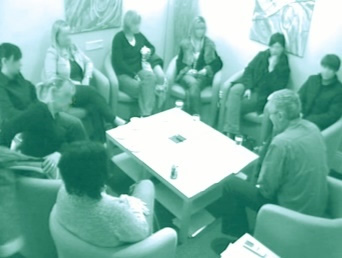
You Are Here: Counselling > Info Base > Grief & Loss (page 2 of 2)
Other Pages: Full Contents - About Me - Alcohol - Stress - Anxiety - Assertiveness - Depression - Tests - Home Page
In this section:Common Symptoms of Grief - Coping with Loss - Faith and Belief -Could Counselling Help?
Previous Page: Understanding Grief & Loss - Bereavement - Grief & Depression - Different Types of Loss - De-bunking stock phrases about Grief - Stages of Grief
The experience of loss affects different people in different ways. Whilst many people may experience the types of symptoms described below, this list is far from being exhaustive. Almost any reaction can be possible. The thing to watch out for is reactions which are positively harmful, such as drinking excessively, self harm, risk-taking or not caring about oneself to the point where it represents a risk to health or general well-being.
- Shock and disbelief – many people experience a sense of unreality following a significant loss. The event that just happened can be so "unreal" as to quite literally be unbelievable. Clients often tell me about the experience of waking up in the morning, thinking that they have merely dreamed about the loss, only to realise the awful reality as they come around and gain full consciousness. People often reflect this sense of unreality and disbelief in their behaviour by leaving things just as they are, for example, in the deceased person's room or wardrobe. They are unable to accept (yet) that the person who is gone truly will not need those possessions again. This can happen in other situations too. I remember one client who continued to travel to work for many weeks after he had been made redundant from his job after 25 years of service. The poor man simply could not accept that he no longer worked there.
 A sense of unreality - not only can the loss be so shocking as to create disbelief, it can also create for the bereaved person a sense of unreality, as if they themselves are living in some kind of dream or trance. Many find it hard to believe that the rest of the world is not affected like they are. I can clearly remember one client telling me how surprised she was to notice that the buses were still running, as she travelled home from the hospital where her husband had died following a heart attack.
A sense of unreality - not only can the loss be so shocking as to create disbelief, it can also create for the bereaved person a sense of unreality, as if they themselves are living in some kind of dream or trance. Many find it hard to believe that the rest of the world is not affected like they are. I can clearly remember one client telling me how surprised she was to notice that the buses were still running, as she travelled home from the hospital where her husband had died following a heart attack.- Sadness – sadness is the symptom of grief that most people expect and recognise. The bereaved may experience a profound sense of hopelessness, emptiness, despair, a yearning so bad that it hurts physically and of course often a sense of unfathomable loneliness. Clearly, such responses are often associated with intense crying, social withdrawal, numbness, even a sense approaching that of catatonia where the individual seems locked into their sadness and completely cut off from the outside world. Although sadness is of course a completely natural and understandable response to loss, it is important to notice and act quickly if the person concerned appears to be completely overwhelmed by sadness for a significant period of time (very many weeks running into months for example). There may be a risk of suicide. One of my clients, a family man and a hitherto completely stable and psychologically healthy individual was referred to me after he tried to commit suicide when the firm he had worked for since school was taken over by another organisation. Although the changes were very significant, the person concerned was not at risk of losing his job. He simply could not cope with the loss of everything with which she had been so familiar, for so many years.
- Shame or Guilt – this is extremely common and usually manifests itself some days or weeks following the initial loss as the bereaved person reflects more on the relationship or situation which no longer exists. Almost anyone can be affected by this type of shame, guilt or regret because in hindsight, there are always going to be things that we wish we had done differently. Some of the saddest situations I have encountered in my work involve people affected by the sudden or unexpected death of a loved one; there are often many things that were left unsaid. One client I worked with lost her husband when he was run over and killed by a car on a routine shopping trip. How she wished she had told him she loved him as he went out of the door -- something she would ordinarily or routinely have done. That old saying "never let the sun go down on argument" springs to mind here. Similarly, many people are convinced that if only they had acted differently or sooner or if they had been in a different place or done something at a different time, they might have been able to make a difference and the person or lost object concerned might still be here.
Those listening to such regrets often try to talk the person out of them but I find there is little point in doing this. They are determined to believe what they wish to believe. Eventually, the person's own rational processes will cause them to realise that these beliefs simply do not stand up to scrutiny but they have to be left to work this out for themselves. Oftentimes, the bereaved person would sooner believe that they could have made a difference, rather than accept their powerlessness or helplessness in that situation.
A common variation on this theme is when a bereaved person has temporarily left the bedside of a dying loved one, only to find that they have passed away during their absence. The bereaved often feels as though they have "let the deceased person down somehow" by not being there at the moment of their passing. My experience and that of many people I have spoken to who work in care homes and hospices, is that dying people frequently do not want people they love to witness their last moments. Perhaps they are trying to protect them from something, perhaps they simply want to be at peace with themselves -- I do not know -- but this is certainly a very common phenomenon and not something about which the living survivors should berate themselves. Again though, letting go of such thoughts is a process which can take its time. - Anger – for some people anger is a strange or worrying emotion to experience, especially if the loss concerns the death of someone close. "Why am I so angry?" Clients often ask this question. The fact is, life can be very unfair and it can distribute losses rather unevenly, leaving us with a sense that some of us suffer more than others. "Why was I the one whose job had to go?" or "Why did my partner have to get cancer and die in his 30s? She/he was a good person. They never did anyone any harm! Look at all those bad people who live to be ancient!"

Sometimes we just want answers or explanations and we get angry when there are none. Maybe we want it to be someone's fault -- the doctors missing a diagnosis, not acting quickly enough to deal with that infection, the criminal justice system releasing the schizophrenic who goes on to kill again. Even if the loss was nobody’s fault, we may feel angry and resentful towards someone -- anyone -- ourselves, God, the system, or just life in general.
"Sometimes we may angry about the loss and just want someone or something to blame". Photo: Imagery Majestic.
This type of anger is again often (but not always) a response experienced as we reflect somewhat later following the loss itself. Another type of anger and one which in some ways can be even more disturbing, is the anger we may feel somewhere down the line, directed towards the person who has died. The bereaved person may have loved the deceased dearly and probably still does, yet there may be times when they feel angry with them for having left them in this situation. The bereaved person may be facing financial insecurity, or may be left to deal with a complicated estate. They may be angry with them for not having dealt better with things during their life. Then again, they may simply just be angry with them for leaving them feeling so alone. These complex and often contradictory feelings and emotions need to find expression if the bereaved person is to mourn and move on from their loss.  Anxiety – A signficant loss can precipitate lots of fear. The new situation is almost always not one in which the bereaved person would like to find themselves. If they have lost their job, there may be all the financial worries and perhaps the insecurity of losing one's home. There is all the extra work involved in locating a suitable job, perhaps facing all sorts of new challenges at a time when personal confidence is likely to be low. Writing a CV, for example, may be something with which the person concerned is entirely unfamiliar; or at least they may not have been required to do this for very many years.
Anxiety – A signficant loss can precipitate lots of fear. The new situation is almost always not one in which the bereaved person would like to find themselves. If they have lost their job, there may be all the financial worries and perhaps the insecurity of losing one's home. There is all the extra work involved in locating a suitable job, perhaps facing all sorts of new challenges at a time when personal confidence is likely to be low. Writing a CV, for example, may be something with which the person concerned is entirely unfamiliar; or at least they may not have been required to do this for very many years.
"No one ever told me that grief felt so like fear". C. S. Lewis
If the loss concerns the death of a loved one, the bereaved person (or persons) may need to take on new responsibilities; they may need to change their routines or adjust to a completely new lifestyle. For example, what if the person who died was the only one in the couple who drove? Suddenly the whole family may be involved in meeting the needs of the person left behind. Facing such anxieties can, not surprisingly, lead to the bereaved person experiencing panic, dizziness or physical symptoms (like tummy troubles or severe headaches) and/or knock the confidence of even the most capable of people. It is at times like this that the support of family or friends can be vital.
An example: When my dad died my mum was, fortunately, still able to drive and remain mobile and independent but as well as dealing with her inevitable sadness,at she also had to face unfamiliar practicalities. She became very anxious, for example, when the car was due for its annual service and MOT. Never in her entire life had she needed to take a car into the garage! The temptation was to simply do this for her but this would not have helped her to overcome her concerns and nor would it have boosted her confidence. Instead, I made sure I was with her when she telephoned to make the appointment. I then accompanied her to the garage. I stood to one side as she spoke to the reception staff, who were very patient and welcoming. They were fantastic with her (the Toyota garage down Leeds Road in Huddersfield by the way) and afterwards, one of them winked at me and gave me a look that seem to say to me "I know exactly what you are trying to do".- Other Symptoms - This is not meant to be an exhaustive list, merely an illustration. Sleeplessness, loss of appetite, untypical obsessive or compulsive behaviours, physical illness, rapid mood changes -- and many, many other behaviours or symptoms may occur. These are probably nothing to worry about in the short term. If they become part of a pattern of unwelcome or unhelpful coping, if they are very severe, if they continue for many months, seem to be increasing in intensity or getting worse, if there seems to be a risk of suicide -- then in any of these cases it may be appropriate to seek the help of your GP who, following careful assessment, may suggest counselling and medication. Remember though, in and of itself, grief is not an illness. It is a natural and understandable response to a significant loss and as such it may be accompanied by some apparently worrying signs and symptoms.
I have made the point already that the support of friends, family or colleagues is extremely important when it comes to dealing with the loss. I think there are two types of support; practical and emotional. Practical support might mean helping out with transport, finance or doing the things that the person affected by the loss is unable to do, especially for example there has been a loss of function following illness or injury. Such support helps the person concerned to feel less isolated, can reduce their anxiety and help them feel loved and cared for at a time when they themselves may be feeling pretty wretched, even worthless.
The other type of support -- emotional support -- is just as important in helping someone cope well with loss. If you are the person facing the loss it is important to express your feelings even if you are not normally comfortable doing so. Do not be tempted to "put a brave face on things". Sharing what you feel enables people to be more aware of your needs and therefore more able to respond to them. However and just as importantly, it facilitates you to move through that long process of coming to terms with what has happened. For tens of thousands of years human beings have dealt with things by sitting around and talking about them, perhaps telling stories of the dearly departed, remembering their deeds and honouring their memory.
Talk, for goodness sakes, talk!
Every time you tell your story you have to structure it into a narrative in order to tell the tale in a coherent manner which is understandable to those around you. The more you do this, the more it will become part of your overall lifelong narrative or life story. One of the things that makes loss so difficult to deal with, is the way that the events are often unexpected or at odds with our life plans. They effectively "stick out like a sore thumb" from the normal, everyday course of life events. The loss is often unplanned or unexpected and even if it is expected the ramifications are rarely fully appreciated in advance. Part of the grieving process involves dealing with this "lumpy mess" which intrudes upon our day-to-day thoughts and existence. The best way to make sense of things is -- quite simply -- to talk about them. The more you talk, the better it is, the more you will "process" your experiences. And if you are able to express and allow yourself to feel your feelings as you talk (e.g. cry, get angry etc), so much the better. Whatever you do, do not try to grieve alone. Rumination is to invite depression.
Talking about your feelings also helps you to feel connected to people at a time when you may be feeling alone, abandoned or misunderstood. The more you can connect, the more you can feel that the burden of your grief is shared. Do not for goodness sakes think that the most important thing is to "be strong" by keeping things to yourself. The strongest and bravest thing you can do is acknowledge the full impact of the loss by talking about it openly with others. That is what takes courage, not bottling it all up inside! Remember also that people can really only help and support you effectively if they are aware of your feelings and needs. Even people who care about you are not telepathic!
I know, I know. Many of us are raised to believe that we should "just get on with things", "stiff upper lip" or that emotions are for "wimps, children or girls". From the point of view of your psychological well-being, all of that is simply rubbish. See why by reading "You must be strong" here.
Loss, especially bereavement, can represent a challenge to faith and religious belief. Those who provide pastoral care understand that faith can be challenged at such difficult times. Do not be afraid to share your fears, doubts and concerns with them. a great deal of comfort can be gained from embracing religious and spiritual activities at the time of loss. Regular repeated activities like prayer, meditation or other faith activities can provide much needed structure at a time when we may feel that our lives are falling apart. Religious practice can help us to find meaning and answers at a time of seeming random events and meaninglessness.
 Join a support group – Grief can feel very lonely, even when you have loved ones and friends around. Sharing your sorrow with others who have experienced similar losses can help in a different way. To find a support group in your area, look at the website of your local council or hospital trust.
Join a support group – Grief can feel very lonely, even when you have loved ones and friends around. Sharing your sorrow with others who have experienced similar losses can help in a different way. To find a support group in your area, look at the website of your local council or hospital trust.
It is very easy to feel isolated and alone at a time of significant loss. We can even feel as if we are the only person who has been through that which we are experiencing. However, you may find that others who are facing your situation have joined together in a support group. In Huddersfield area, for example, there are many excellent support groups; for instance, groups which exist to support parents following miscarriage, those facing the loss associated with a relative having dementia, people affected by loss of sight from macular degeneration, children dealing with the loss of a parent. A good place to identify support groups relevant to your needs is the website of your local council. In the case of Kirklees click here.
Although grief and grieving are natural processes of healing following loss, it can occasionally be the case that the bereaved person is completely overwhelmed by what they are experiencing. A counsellor can be someone who offers help to facilitate the process, particularly if you feel that you have become "stuck". Unless you have no one else with whom you can talk, following a loss, I do not usually recommend consulting a counsellor right away. I think it is more important to engage in dialogue with friends and family. However, not everyone is in this happy position of having support or they may feel that the level of support available is lacking or that their need for support exceeds what might be on offer. Similarly, you may have turned to your family and friends yet still be feeling stuck or lost. In all these cases, counselling can help.Another advantage of counselling is that you do not have to worry about "burdening" the counsellor with your troubles and he or she will not become impatient if you repeat yourself or cover the same ground again and again. In fact, it is very often important or even necessary to do this in order to facilitate the recovery process.
Moreover, the counsellor trained to deal with loss and grief has access to specialist training and knowledge designed to help facilitate the process. We know from training and indeed experience, what helps and what does not. We are much less likely than the norm, I would hope, to come out with all those old cliches like "Time is a great healer!" Nor need you be concerned if what you say appears not to make sense, is irrational or contradictory. As a counsellor, I understand that grieving is often an irrational or illogical process, characterised by conflicting and contradictory emotions, many of which apparently seem not to make sense. Indeed, I believe it is extremely helpful to be supported to "stay with" these difficult and contradictory experiences in order to come to terms with what has happened.
NHS counselling for loss, grief and bereavement
 The provision of bereavement counselling via your GP on the NHS varies significantly from place to place. In the Calderdale and Kirklees areas, counselling for bereavement on the NHS is available subject to a waiting list.
The provision of bereavement counselling via your GP on the NHS varies significantly from place to place. In the Calderdale and Kirklees areas, counselling for bereavement on the NHS is available subject to a waiting list.
Counselling from the Voluntary sector
The charity and voluntary sector may offer alternatives. Cruse is probably the best-known charity offering bereavement support. They after a national telephone helpline and have branches across the UK, including here in Huddersfield. Services are provided by volunteer counsellors, some of whom are part way through their training. Click here for their website.
If you think that Christian counselling might be helpful, consider contacting United Churches Healing Ministry (UCHM) in Milnsbridge Huddersfield. This charity does excellent work, offering high-quality counselling, delivered by well trained and supervised volunteers. Clients are asked to make a donation based on their income, keeping in mind that it costs about £35 per session delivered, just to meet the running costs of the charity. You do not have to be a Christian to use the service (although if you are it represents a fantastic opportunity to receive counselling in line with your beliefs) and they also offer non-Christian counselling. Demand for counselling is such that there is usually a waiting list.
Counselling with Me, Dr Alan Priest
If you would like to contact me to discuss counselling for a loss or bereavement (or indeed any other issue) please click here to go to my contact page where you can obtain my phone number or send me an e-mail. I am usually able to offer an appointment within a few days of your contact. My fees will reflect your ability to pay and I offer a few low-cost places for clients living on very low incomes or state benefits. I also work with all the major private health insurance providers and many smaller ones. If you are a patient at Lindley Village Surgery and you are referred by your GP, the first session is free. If you are a patient at another surgery and you want this facility, ask your GP or their practice manager to contact me. Back to Top
"The friend who can be silent with us in a moment of despair or confusion, who can stay with us in an hour of grief and bereavement, who can tolerate not knowing... not healing, not curing... that is a friend who cares".
Henri Nouwen Dutch-born Catholic priest and author of many books about spirituality.